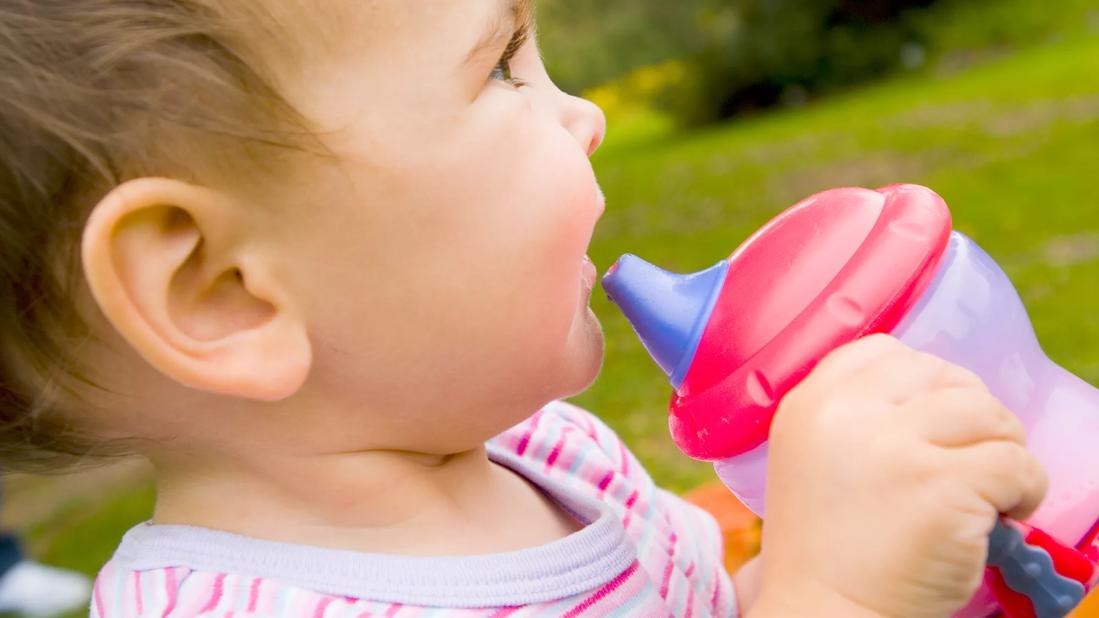Slowly introducing cow’s milk (or soy milk) can help your child make the change

Make the formula. Feed your cutie. Wash, rinse, repeat.
Advertisement
Cleveland Clinic is a non-profit academic medical center. Advertising on our site helps support our mission. We do not endorse non-Cleveland Clinic products or services. Policy
For parents of babies who gulp down bottles of formula, you’ve been doing this routine several times a day (and night) for what seems like forever.
But the end is in sight. Your baby is finally old enough and ready to transition to cow’s milk or a milk alternative.
Here’s how to make it happen, explains pediatrician Radhai Prabhakaran, MD.
The switcheroo from formula to milk typically comes after your child’s first birthday. Up until that point, growing babies need the vitamins and nutrients packed into formula or breast milk, says Dr. Prabhakaran.
But fortified formula becomes less essential as your kiddo starts eating solid foods. Fruits, vegetables, grains and meats begin filling their nutritional needs spoonful by spoonful.
Whether babies are ready to hop aboard the milk express depends on their taste for table food.
“Some babies settle into a mostly solid food diet early (between 9 and 12 months) because they like it and it agrees with them,” notes Dr. Prabhakaran. “If they’re eating a nutritionally balanced diet, then it’s OK to wean your baby off formula by age 1.”
Babies may not be able to talk, but they can express strong opinions — especially when it comes to eating. (Remember that shiver-and-gag reaction they gave a certain food? There’s your sign!)
Advertisement
Your little one’s initial judgment on milk will go a long way toward deciding how to work dairy into their diet, says Dr. Prabhakaran.
An immediate love of dairy makes the process easier. So, if milk brings a big smile to your child’s face:
The transition to milk won’t be as simple if your baby seems to cling to formula as their No. 1 option. Try these steps to ease the transition:
Ease off on making the change from formula to milk if your child starts to experience stuffiness or you see a dramatic change in their stools, advises Dr. Prabhakaran. These symptoms could be a sign of a potential dairy allergy.
Signs your baby may not be able to tolerate cow’s milk include:
Talk to your baby’s pediatrician if those symptoms appear. If needed, your healthcare provider can recommend safe milk alternatives.
Your baby should continue with formula if they:
“And if your doctor has already told you that your baby might need to go on a special diet, talk to them before weaning your baby off formula,” stresses Dr. Prabhakaran. “They can help you put a nutrition plan in place that will make the transition safer.”
Whole milk is generally recommended for toddlers, who need the extra fat in the drink to boost growth and brain development. “The general rule is whole milk until they’re 2 years old unless there are specific circumstances,” says Dr. Prabhakaran.
Your doctor may recommend 2% milk instead if your baby:
Advertisement
Fortified soy milk is considered the primary milk alternative that can meet a child’s nutritional needs, according to the U.S. Centers for Disease Control and Prevention (CDC). Choose an unsweetened variety to avoid excess sugar. Make sure it’s fortified with vitamin D and calcium.
And you can talk to your child’s healthcare provider about the milk alternatives you’re considering.
“There are so many choices and babies’ diets vary so much. It’s impossible to have a blanket rule for what’s OK,” says Dr. Prabhakaran. “Your baby’s doctor can help you find the best alternative to help your child with specific deficiencies and their overall nutrition.”
As long as you’re saying goodbye to formula, why not get rid of that baby bottle, too? Drinking from a bottle is typically a no-no after age 1. “Bottle-feeding can affect teeth growth and cause cavities,” says Dr. Prabhakaran.
So, look to transition to a sippy, straw or regular cup.
“If you’re feeling really adventurous, wean them off formula and the bottle at the same time,” she says.
Advertisement

Sign up for our Health Essentials emails for expert guidance on nutrition, fitness, sleep, skin care and more.
Learn more about our editorial process.
Advertisement

In babies under 12 months old, cow’s milk has been associated with gastrointestinal bleeding

No juice until your child is 1 year old — and even then, they shouldn’t have much, if any

Ultimately, the choice depends on what works best for you and your baby, but it’s also important to be aware of the pros and cons of both

Ideally, you want your toddler to be drinking from a ‘big kid cup’ by age 2

Letting your baby feed themself foods the whole family enjoys has its benefits — but stick to softer foods and follow safe-eating guidelines

Levels are generally low, but there are ways to minimize potential health risks

In babies under 12 months, honey may cause a serious illness called infant botulism

A daily dose of vitamin D can help babies build strong bones, as well as boost their brain development

Even small moments of time outdoors can help reduce stress, boost mood and restore a sense of calm

A correct prescription helps your eyes see clearly — but as natural changes occur, you may need stronger or different eyeglasses

Both are medical emergencies, but they are very distinct events with different causes